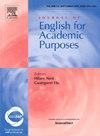Developing a genre-based research article reading module for undergraduate students
IF 3.4
1区 文学
Q1 EDUCATION & EDUCATIONAL RESEARCH
引用次数: 0
Abstract
Although research articles (henceforth RA) have been widely used in undergraduate teaching as assigned readings or supplementary teaching materials, studies addressing students' challenges in RA reading are infrequent. We conducted a two-cycle action research to examine the effect of genre instruction on RA reading comprehension of Year 3 and 4 undergraduate students in economics. In Cycle 1, students (n = 34) were introduced to move structures of conventional sections, including Introduction, Method, Results, Discussion, and Conclusion; in Cycle 2, students (n = 34) were introduced to a discipline-specific move model of economics. Apart from the conventional sections, the model used in Cycle 2 also describes the rhetorical structure of discipline-specific sections, such as Theoretical Model, Econometric Model, Robustness, and Mechanisms. Summary writing and multiple-choice tests were used to measure students' improvements in reading comprehension. The findings show that Cycle 2 instruction significantly improved students’ performance in summary writing (medium effect size) and multiple-choice tests (small effect size), whereas Cycle 1 instruction did not. Also, fewer students in Cycle 2 perceived cognitive overload challenges than their peers in Cycle 1. The findings can be useful for EAP practitioners teaching similar cohorts of students.
为本科生开发基于体裁的研究文章阅读模块
尽管研究性文章(以下简称RA)作为指定读物或辅助教材被广泛应用于本科教学中,但针对学生在RA阅读中遇到的挑战的研究却并不多见。我们开展了一项分为两个周期的行动研究,以考察体裁教学对经济学专业三、四年级本科生RA阅读理解的影响。在第一周期,我们向学生(34 人)介绍了常规章节的移动结构,包括引言、方法、结果、讨论和结论;在第二周期,我们向学生(34 人)介绍了经济学学科特定的移动模型。除了常规章节外,第二周期使用的模型还描述了学科特定章节的修辞结构,如理论模型、计量经济学模型、稳健性和机制。总结性写作和多项选择测试用于衡量学生在阅读理解方面的进步。研究结果表明,第二周期教学显著提高了学生在摘要写作(中等效应大小)和多项选择测试(小效应大小)中的表现,而第一周期教学则没有。此外,与第一周期的学生相比,第二周期的学生较少感受到认知负担过重的挑战。这些研究结果对教授类似学生的 EAP 从业人员很有帮助。
本文章由计算机程序翻译,如有差异,请以英文原文为准。
求助全文
约1分钟内获得全文
求助全文
来源期刊

Journal of English for Academic Purposes
Multiple-
CiteScore
6.60
自引率
13.30%
发文量
81
审稿时长
57 days
期刊介绍:
The Journal of English for Academic Purposes provides a forum for the dissemination of information and views which enables practitioners of and researchers in EAP to keep current with developments in their field and to contribute to its continued updating. JEAP publishes articles, book reviews, conference reports, and academic exchanges in the linguistic, sociolinguistic and psycholinguistic description of English as it occurs in the contexts of academic study and scholarly exchange itself.
 求助内容:
求助内容: 应助结果提醒方式:
应助结果提醒方式:


